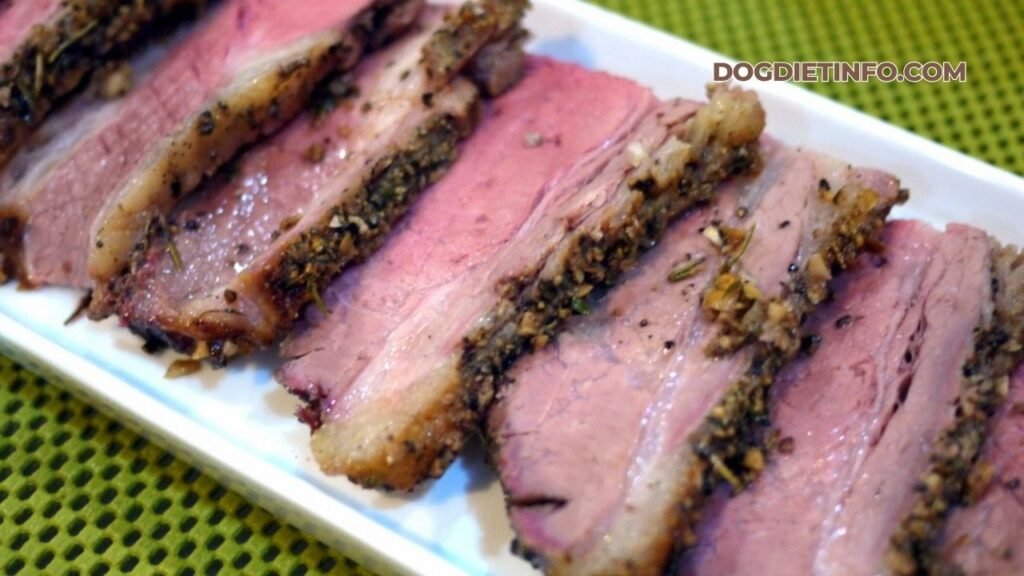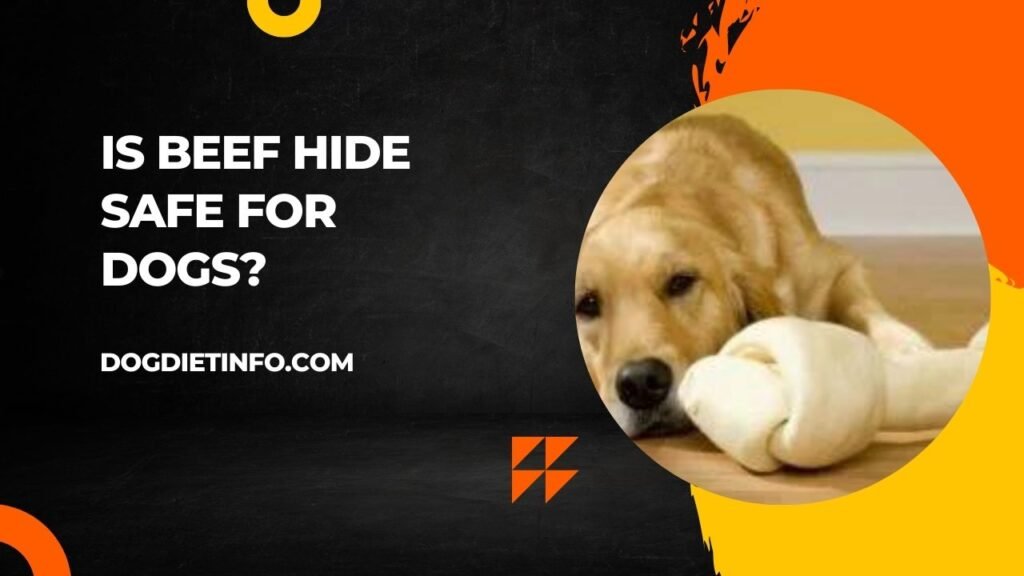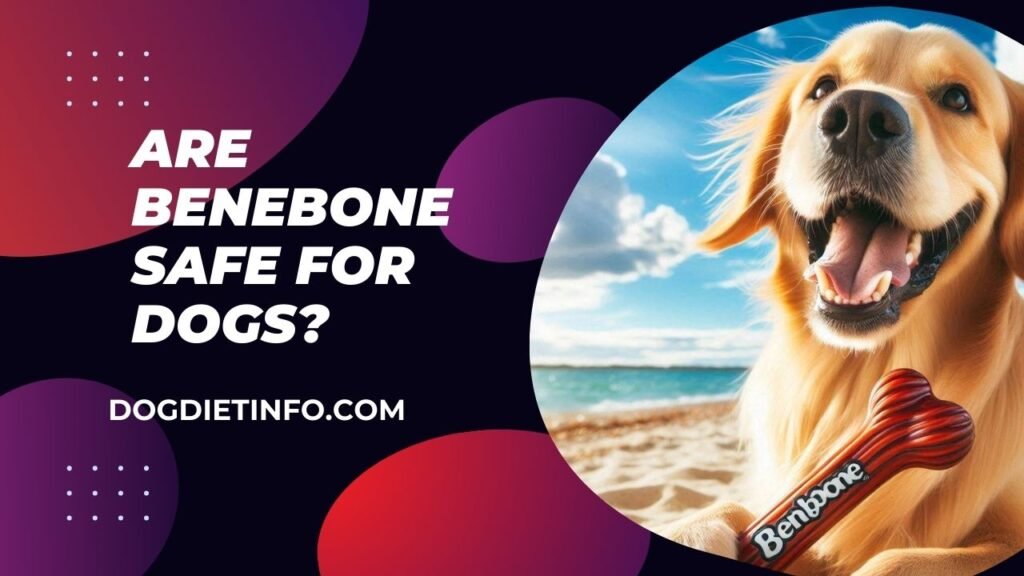Is Beef Hide Safe For Dogs? Beef hide can be safe for dogs in moderation, but some dogs may experience digestive issues or choking hazards.
As a responsible dog owner, you’re always on the lookout for ways to keep your furry friend happy and healthy.
Chewing is a natural behavior for dogs that helps relieve stress, clean their teeth, and prevent boredom.
One of the most popular chew options available on the market is beef hide, also known as rawhide.
While beef hide has been a staple for many dog owners, concerns about its safety and digestibility have surfaced in recent years.
So, is beef hide safe for dogs? The answer depends on various factors like the quality of the product, the size of the chew, and how well you monitor your dog’s chewing habits.
In this guide, we’ll dive deep into what beef hide is, the pros and cons of giving it to your dog, and safer alternatives you might want to consider.
Contents
What Is Beef Hide?
Beef hide, or rawhide, is made from the inner layer of cow or horse hides. After the outer hair and fat are removed, the hide is cleaned and cut into various shapes, such as bones, rolls, or twists.
These products are then dried, which creates a tough chew that dogs enjoy gnawing on for hours. [Is Beef Hide Safe For Dogs?]
Beef hide serves two primary purposes: it satisfies your dog’s innate desire to chew, and it helps maintain their dental health.
As a dog chews on beef hide, it scrapes away plaque and tartar, contributing to healthier teeth and gums. However, not all beef hide products are created equal, and some can present risks if not carefully selected.
Types of Beef Hide Products
- Rawhide Strips: These are long, thin pieces of rawhide that can soften over time as the dog chews. They’re ideal for smaller dogs or those with less aggressive chewing habits.
- Pressed Hide: This is rawhide that has been tightly compressed into a more durable product. It’s suitable for dogs that chew more aggressively, as it tends to last longer.
- Rolled Rawhide: Layers of rawhide are rolled into a bone or stick shape. These are popular because they can be fairly long-lasting and are available in various sizes to suit different breeds.
Is Beef Hide Safe For Dogs?
Beef hide can be safe for dogs, but there are some important caveats. Here are the key factors to consider:
Nutritional Value
Beef hide itself does not offer significant nutritional benefits beyond keeping your dog occupied and aiding in dental health. [Is Beef Hide Safe For Dogs?]
Chewing on beef hide can reduce plaque and tartar buildup, leading to healthier teeth and gums. It also satisfies a dog’s natural urge to chew, which can help relieve boredom and anxiety.
Additionally, chewing on beef hide can help strengthen your dog’s jaw muscles. For young puppies who are teething, it can provide relief by soothing sore gums.

Potential Risks
Although beef hide chews can offer some benefits, they do carry risks that you need to be aware of:
Choking Hazard: One of the biggest risks associated with beef hide chews is the potential for choking. If your dog chews off large chunks of the hide, these pieces can become lodged in their throat, leading to choking or even suffocation. It’s essential to monitor your dog while they’re chewing and remove the chew if it begins to break into small pieces.
Digestive Blockages: Ingesting large pieces of beef hide can also cause blockages in the digestive system. These blockages may require surgery to remove, which can be expensive and dangerous for your dog. Symptoms of a blockage include vomiting, loss of appetite, and lethargy. If you notice any of these signs, contact your veterinarian immediately.
Chemical Contaminants: Some beef hide chews are processed using harsh chemicals like formaldehyde or bleach. These chemicals are used to clean the hide and make it more durable, but they can be harmful to your dog if ingested. Always look for chews that are free of artificial preservatives, chemicals, and dyes.
Digestive Upset: Some dogs may have difficulty digesting beef hide, which can lead to stomach upset or diarrhea. If your dog is prone to gastrointestinal issues, you may want to avoid beef hide altogether or limit their access to it. [Is Beef Hide Safe For Dogs?]
Quality Matters
The safety of beef hide chews largely depends on their quality. High-quality beef hide chews are typically made from 100% natural ingredients and processed without harmful chemicals.
Low-quality products, on the other hand, may contain additives and preservatives that could be dangerous for your dog.
When purchasing beef hide chews, always opt for those made in countries with stringent manufacturing regulations, such as the United States or Canada.
These products are less likely to contain harmful chemicals and are often made with better ingredients. [Is Beef Hide Safe For Dogs?]
Size and Supervision
It’s crucial to select the right size of beef hide chew for your dog. Small dogs should only have small chews, while larger dogs need bigger ones to prevent them from swallowing large chunks.
Always supervise your dog while they’re chewing to ensure they don’t bite off more than they can safely handle. [Is Beef Hide Safe For Dogs?]
If your dog is an aggressive chewer, they may be more prone to breaking off large pieces of beef hide. In this case, consider offering them a more durable chew, such as a compressed hide or one of the alternatives listed below.
How To Choose Safe Beef Hide Chews For Your Dog
Selecting the right beef hide chew can make all the difference in ensuring your dog’s safety. Here’s how to pick the safest option:
1. Check for Additives
Some beef hide products are treated with chemicals to improve their appearance or shelf life. Always read the label and avoid products that contain artificial additives like preservatives, colors, or flavor enhancers.
These chemicals can upset your dog’s stomach and lead to long-term health problems. [Is Beef Hide Safe For Dogs?]
Instead, look for products labeled “natural” or “chemical-free.” These are typically made without harmful chemicals and are safer for your dog to chew on.
2. Select the Right Size
The size of the chew should correspond to the size and chewing style of your dog. Smaller dogs with gentle chewing habits should have smaller, softer chews.
Larger dogs or aggressive chewers, on the other hand, need thicker, more durable chews that won’t break apart easily.
If your dog tends to break off large pieces of beef hide, it’s best to remove the chew before they can swallow it. Always choose a size that allows your dog to chew safely and avoid choking hazards.
3. Origin and Source
The source of the beef hide is just as important as its quality. Chews made in countries with strict manufacturing regulations are generally safer than those made in countries with less stringent standards.
The United States, Canada, and some European countries have strict guidelines for processing beef hide products. [Is Beef Hide Safe For Dogs?]
Avoid products from countries with a history of poor quality control, as they may contain harmful chemicals or additives.
Reputable brands will often disclose where their products are sourced and processed, so check the label for this information.
4. Monitor Chewing Time
Even the safest beef hide chew can become dangerous if your dog spends too much time chewing on it. Prolonged chewing sessions increase the risk of your dog breaking off and swallowing large pieces, which can lead to choking or digestive blockages.
It’s a good idea to set a time limit for your dog’s chewing sessions, especially if they’re an aggressive chewer. [Is Beef Hide Safe For Dogs?]
A 20-30 minute chew session is usually sufficient, after which you should take the chew away and offer a different type of toy.
Alternatives to Beef Hide
If you’re concerned about the risks associated with beef hide, there are plenty of alternatives that can provide the same benefits without the potential dangers. Here are some of the best options:
1. Bully Sticks
Bully sticks are made from the dried pizzle (penis) of a bull. While this may sound unappealing, they’re an excellent natural chew option for dogs.
Bully sticks are fully digestible and offer similar dental benefits to beef hide without the risk of blockages or choking. They’re also rich in protein and free from artificial additives.
2. Deer Antlers
Deer antlers are another natural, long-lasting alternative to beef hide. [Is Beef Hide Safe For Dogs?]
They’re tough enough to withstand aggressive chewing and contain nutrients like calcium and phosphorus, which can benefit your dog’s bones and teeth. Antlers are also odorless, which is a bonus for many pet owners.
3. Nylon Bones
Nylon bones are synthetic chews that come in various shapes, sizes, and flavors. These bones are designed to be durable and are great for aggressive chewers.
However, it’s important to choose a nylon bone that’s appropriate for your dog’s size and chewing style, as some dogs may break off small pieces that could pose a choking hazard.
4. Rubber Toys
Rubber chew toys, such as Kongs, are another safe and durable option. They can be stuffed with treats or peanut butter to keep your dog entertained and satisfy their chewing instincts.
Rubber toys are non-toxic and come in a variety of sizes, making them suitable for all breeds. [Is Beef Hide Safe For Dogs?]
Final Verdict
So, is beef hide safe for dogs? The answer depends on the quality of the product, the size of the chew, and how carefully you monitor your dog.
High-quality, natural beef hide chews from reputable sources are generally safe for dogs when given in moderation.
Always choose a size that’s appropriate for your dog and supervise them while they’re chewing to prevent choking or digestive issues.
If you’re still concerned about the potential risks, there are plenty of safer alternatives, such as bully sticks, deer antlers, nylon bones, and rubber toys.
These options can provide the same dental benefits and chewing satisfaction without the dangers associated with beef hide. [Is Beef Hide Safe For Dogs?]
See Also: Are Collagen Sticks Safe For Dogs?
FAQs
Can all dogs eat beef hide?
Not all dogs should eat beef hide. Dogs with sensitive stomachs or aggressive chewers may have issues with rawhide, and it’s essential to monitor how your dog responds.
How often should I give my dog beef hide?
Beef hide should be given as an occasional treat rather than a daily chew. Limit it to once or twice a week, depending on your dog’s size and chewing habits. [Is Beef Hide Safe For Dogs?]
What should I do if my dog swallows a large piece of beef hide?
If your dog swallows a large piece of beef hide, monitor them closely for signs of choking or digestive distress, such as vomiting or difficulty breathing. Contact your vet if any issues arise.
Are rawhide and beef hide the same thing?
Yes, rawhide is a type of beef hide, made from the inner layer of cow skin. Both terms are often used interchangeably, but rawhide typically refers to the less processed form.
How can I tell if a beef hide chew is high quality?
Look for chews made from 100% natural beef hide, without any artificial preservatives or chemicals. Also, check for transparency in sourcing and manufacturing processes from reputable brands.
Conclusion: Is Beef Hide Safe For Dogs?
In summary, beef hide can be a safe and enjoyable chew for your dog if chosen carefully and given under supervision.
Always prioritize high-quality products from reputable sources, and be mindful of your dog’s chewing habits to avoid potential risks.
If you’re still uncertain, there are plenty of alternative chews available that are just as fun and safe for your dog.

Derrick Wilcox is a certified canine behaviorist with over 12 years of experience at Happy Paws Animal Clinic and Pawsitive Training Center, helping pet owners ensure safer, healthier, and happier lives for their dogs.



